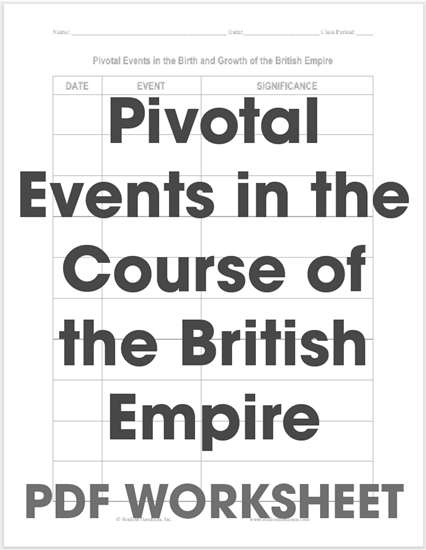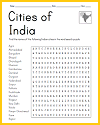| Pivotal Events in the Course of the British Empire |
|---|
| www.studenthandouts.com ↣ World History ↣ Imperialism ↣ Imperialism Worksheets |
 |
    |
|
Students are asked to chart pivotal events in the birth and growth of the British Empire.
Click here to print. Answers will vary. The birth and growth of the British Empire unfolded over centuries, shaped by pivotal events that expanded its reach and influence around the world. 1497 — John Cabot's Voyage: Cabot's exploration laid early claims to North America for England. 1588 — Defeat of the Spanish Armada: England's naval victory established it as a rising maritime power. 1600 — Founding of the East India Company: This private company spearheaded trade and British influence in Asia, particularly India. 1607 — Founding of Jamestown: The first permanent English colony in North America, marking the start of English settlement. 1763 — Treaty of Paris: Following the Seven Years' War, Britain gained control of Canada and parts of India. 1770 — Claiming of Australia: Captain James Cook claimed eastern Australia for Britain, expanding its Pacific presence. 1788 — First Fleet to Australia: Britain established a penal colony in New South Wales, solidifying control. 1815 — Congress of Vienna: Britain emerged from the Napoleonic Wars as a global superpower with a vast empire. 1858 — British Raj Established: After the Indian Rebellion, the British government took direct control of India. 1884-1885 — Berlin Conference: Britain gained significant African territories during the European division of Africa. These events helped transform Britain from a small island nation into a global empire spanning multiple continents. |
| Imperialism Books and Films | Imperialism Outlines and PowerPoints |
| Imperialism Maps and Pictures | Imperialism Study Games |
| Imperialism Miscellany | Imperialism Worksheets |
| www.studenthandouts.com ↣ World History ↣ Imperialism ↣ Imperialism Worksheets |














































